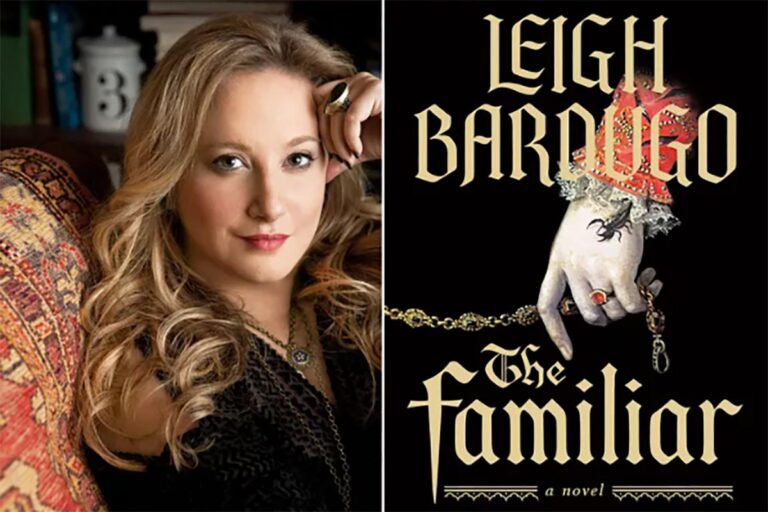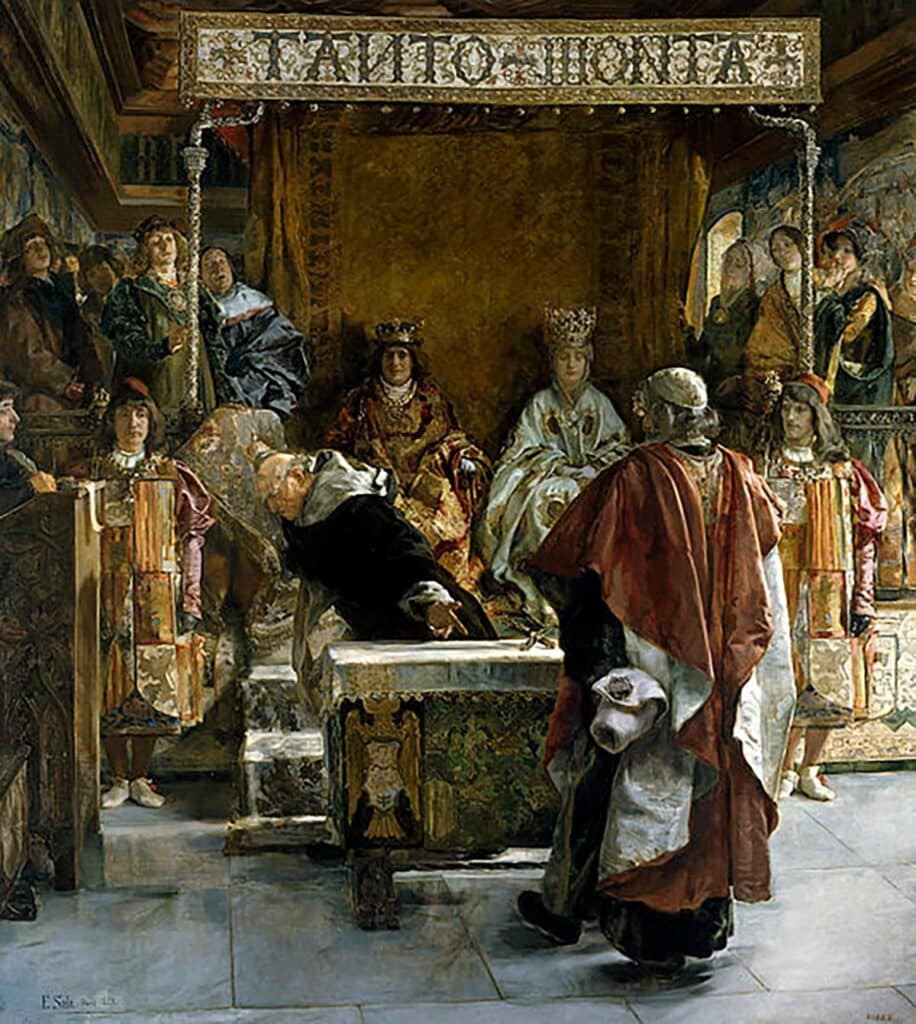
Leigh Bardugo has created a career crafting stories about political oppression and the rise of the downtrodden.
In her latest novel, “The Familiar,” Bardugo puts Sephardic Judaism at the forefront, discussing the experience of conversos — Spanish and Portuguese Jews who converted to Catholicism under duress during the Spanish Inquisition — and the clandestine efforts many took to preserve their Jewish identity.
Judaism has always influenced the 49-year-old’s work, either as a metaphor or through direct references, but Bardugo’s first historical fantasy novel is drawn from her own family history.
Bardugo spoke with Unpacked about why she wanted to dive into her Sephardic roots in “The Familiar,” the importance of telling diverse Jewish stories, and the presence of Jewish themes in all her work.
Read more: Unpacked’s top Jewish book picks for 2024
“The Familiar” throws its readers into the life of a converso in Renaissance Spain
Released on April 9, “The Familiar” quickly became a New York Times bestseller for its strong balance of political intrigue, romance, and magic.
The story follows Luzia Cotado, a scullery maid who must conceal her Jewish identity from the outside world. Luzia uses magic derived from Ladino refranes (sayings) to improve her life in Madrid. However, when her mistress catches her performing magic, Luzia is forced to use her talents for acts to enhance her employer’s social standing.
Once again, Luzia is noticed for her acts of magic — this time by Antonio Pérez, the disgraced secretary to the Spanish king. Seeing an opportunity, Pérez proposes using Luzia’s skills to help Spain defeat Elizabeth I of England, hoping to restore his own status at court.
Thrust into a world of sorcery, alchemy, and fraudsters, Luzia begins to lose track of what’s magic, science and fiction while the risk of her Jewish heritage being exposed intensifies.
“The Familiar” is Bardugo’s look into her own family’s history
Born in Jerusalem, Bardugo grew up in a secular Jewish family in Los Angeles that was Moroccan on her father’s side and Ashkenazi on her mother’s.
Her Sephardic side of the family boasts a family tree that stretches all the way back to 1492 and the start of the Spanish Inquisition when they were expelled from Spain.
“I was already intrigued by the Inquisition and by the history of the Sephardim. I knew that it would be exciting for me to research because I wanted to feel connected with that side of my family,” Bardugo explained.
To authentically depict Ladino culture, translations, and references, she received assistance from Sephardic studies professor Canan Bolel. However, the #1 New York Times bestselling author also drew upon memories of her grandmother.
Even more than her other novels, she felt a responsibility to accurately portray the characters and themes in “The Familiar” since it discussed her heritage.
“It felt like there was a greater weight and responsibility sitting on my shoulders to get the details right. I wanted to do right by this language that has almost been eradicated,” she said.
Research for “The Familiar” opened Bardugo’s eyes to the lives of Spanish Jews during the Inquisition
Bardugo has always felt connected to her Sephardic heritage through the food, language and music of her ancestors. Growing up, her mother would play Ladino songs for her on the piano, and her grandmother would say refranes in front of her.

However, her knowledge of the conversos and the experiences of her family during the Spanish Inquisition was limited. Through her research for “The Familiar,” Bardugo gained a deeper understanding of the poverty that most Spanish Jews endured and the constant fear of pogroms they lived with. This experience challenged misconceptions that the Inquisition mostly targeted wealthy Jewish courtiers.
Bardugo discovered the vast scope and length of the Inquisition, which it formally ended in 1834. Since Jews and Muslims were banned from Spain for over 300 years, Bardugo sought the ideal historical period to set her protagonist’s story — aiming to heighten the stakes of the character’s already precarious situation while adding a layer of political intrigue.
Bardugo chose the period of a century after the Inquisition began, a time marked by Spain’s defeat of the Spanish Armada, the enforcement of limpieza de sangue (blood purity) laws against non-Catholics, and the decline of Spain’s status as the world’s most powerful empire.
“There was a deep anxiety in Spain in terms of its power, influence and national identity — all of this was on the line after the Armada’s defeat. There was this real existential crisis: if God is on our side, then how could this happen?” Bardugo explained. “That felt like a wonderfully fraught time period to throw Luzia into.”
Read more: Cassandra Clare wants readers to feel Jewish magic in “Sword Catcher”
The magic in “The Familiar” fuses Judaism, fantasy, and science
When crafting the Jewish magic in “The Familiar,” her first standalone novel, Bardugo used a technique from her “Ninth House” series to blur the lines between reality and fantasy, ensuring that the story feels anchored in the Spanish Golden Age while incorporating elements of sorcery.
During the 16th century, distinctions between disciplines like alchemy and chemistry, or astrology and astronomy, were not clearly defined. What is today considered magic was integrated into scientific and philosophical thought, which allowed Bardugo to seamlessly weave magic into everyday life during this period.
Bardugo chose to connect Luzia’s magic to her Judaism — the speaking of Ladino refranes (sayings) — because she wanted to reflect her personal engagement with her heritage.
“These refranes are things that rattle around in my head from my childhood, often without me knowing the meaning of them. That’s my connection to my heritage and similarly, it’s the way Luzia connects with her people in exile. These refranes bridge that gap,” Bardugo explained.
Bardugo emphasized that in “The Familiar,” the very magic that makes Luzia special and gives her power is also what risks exposing her Jewish identity. By making herself noticed, even unintentionally, Luzia puts herself on the line.
“This book is very much about power — who has power, who doesn’t have it, and the implications of having a gift but not being able to freely use it. I think something that resonates for many of us is the idea that to be visible is to be seen, which also makes you a target. This is something that Luzia grapples with throughout the entire book,” Bardugo said.
How Bardugo’s Jewish identity has influenced her novels
Bardugo developed an instant love for fantasy novels in junior high, a time when she felt like an outsider at her new school, where she and the local rabbi’s daughter were the only Jewish students.
“I felt like I had crash-landed on an alien planet,” Bardugo recalled. “I walked into the library and a librarian had set out a table of science fiction and fantasy that said, ‘discover new worlds.’ And I thought, ‘boy, would I like to do that.’”
Immersing herself in the world of books, Bardugo began writing her own science fiction and fantasy stories as a survival strategy. This eventually led to her creating several series that explore themes of being an outsider.
One way Bardugo has done this is through Jewish representation; “The Familiar” is not her first novel to reference Judaism or to draw inspiration from the Jewish experience.
Both her Grishaverse novels — which were adapted into Netflix’s “Shadow and Bone,” which ran for two seasons — reflect the experiences of Jews during World War II, and “Ninth House” features a Sephardi protagonist.
“In ‘Shadow and Bone,’ the grisha occupy a similar role to that of Jews in World War II America. They became a kind of brain trust for the U.S. because this was the place where they could flee and be safe. Similarly, Ravka is a safe haven in ‘Shadow and Bone’. It’s not a direct parallel, but it certainly influenced the narrative,” Bardugo said. “Any opportunity to connect to these cultural memories can be very powerful.”
In “Ninth House,” the protagonist, Galaxy “Alex” Stern, is of Sephardic descent. Throughout the first two novels, she delves deeper into her identity, exploring what it means to be a Jew in the diaspora. Bardugo wanted Sephardic readers to see their experiences reflected in Alex’s story. She also crafted Alex’s journey at Yale to reflect her own, portraying an assimilated Jewish identity as a stabilizing force during challenging times when she doesn’t have many familial relations.
“Giving Alex memories of her grandmother and this connection to Ladino, even if she doesn’t understand the words, provides lifelines for her to grab on to,” Bardugo added.
Bardugo advocates for more diverse Jewish narratives
While there are many stories that focus on the Holocaust and Jewish experiences in World War II, Bardugo hopes for a broader representation of Jewish stories that reflect the diversity of Jewish communities worldwide.
“There is a real danger in reducing a people’s story to a single moment in history, and we’ve seen many Holocaust stories. We often see a particular type of American Judaism, like the one portrayed in ‘Curb Your Enthusiasm.’
“I would like to see a wider range of stories told because it can become reductive after a while to only see one vision of a people with such a long history,” Bardugo said.
Working on “The Familiar” and bringing more attention to Sephardic Judaism has deepened Bardugo’s connection to her heritage.
“Writing ‘The Familiar’ made me feel closer to the past and closer to my ancestors, so I dedicated the book to them. It felt like they were with me throughout the writing process,” she said.
